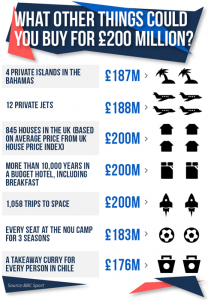Paris-St Germain (PSG) completed their record-breaking deal to sign Brazilian footballer, Neymar, from Barcelona last week on a five-year contract. He has now become the world’s most expensive footballer at a staggering 222 million euros – equivalent to £198 million – more than double the price of the previous £89.3 million world-record deal held by Manchester United footballer Paul Pogba last summer.
Although, it is important to remember that the £198 million price tag is only the initial outlay for the deal. PSG will have to pay the Brazilian footballer his wages, as well as paying fees, which can double the price of the deal.
Some people, including Liverpool manager Jurgen Klopp, has questioned how the transfer has been authorised under the European governing body’s Financial Fair Play (FFP) rules. Barcelona president, Josep Maria Bartomeu, has threatened to report PSG to UEFA for breaching guidelines, claiming UEFA has said it will scrutinise Neymar’s deal as part of continuous monitoring of clubs. However, the body has explained they will not be able to block the deal under any circumstances. In a statement, the UEFA has said: “We are not in a position to stop clubs from buying players, but the clubs will face sanctions if they fail to abide by Financial Fair Play rules.”
The FFP rules were approved in 2010 and first assessments of the rules begun in 2011. The policy was introduced a few years later, in 2013, to stop clubs from accumulating too much debt and in order to stop wealthy football owners from injecting too much money into their clubs; giving them an unfair advantage to other teams. This has since been updated by UEFA, in 2015, to address more specific circumstances, with the aim to persuade football clubs to encourage more sustainable investment, whilst maintaining control on clubs overspending.
The rules and regulations of the FFP state that over a three-year time frame, clubs can only spend 30 million euros more than they earn. PSG, owned by the Gulf state of Qatar, is unlikely to have enough funds to process the deal in full, therefore, it has led to uproar by many. Although, it is possible that PSG have managed to accumulate lots of profits over the past two years to enable such large expenditure this year.
Photo credit: ricochet64/Shutterstock
Will the deal breach FFP rules?
FC Barcelona insisted, prior to the deal being finalised, on getting the whole transfer fee upfront, however PSG will not be instructed to pay the whole £198 million in one go. In FFP accounting purposes, the cost of the transfer fee is often spread over the length of the player’s contract. Neymar signed a five-year deal last week, meaning it will be registered in PSG’s accounts as around £40 million of transfer spending per year. However, £40 million is still an awful lot of money to spend.
Interestingly, it has been reported in Spain that Qatar may even attempt to avoid falling victim to the FFP rules altogether by paying Neymar £270m to become an ambassador for the 2022 World Cup, from which he could buy himself out of his Barcelona contract (even now that the deal has been finalised) and essentially, join PSG for next-to-nothing, without affecting the club’s finances.
If PSG are found guilty of breaching FFP rules, the club will not be excluded automatically, but there will be no exceptions. Depending on different factors, there a catalogue of measures, including:
- Warning
- Reprimand
- Fine
- Deduction of points
- Withholding of revenues from a UEFA competition
- Prohibition on registering new players in UEFA competitions
- Restriction on the number of players that a club may register for participation in UEFA competitions, including a financial limit on the overall aggregate cost of the employee benefits expenses of players registered on the A-list for the purposes of UEFA club competitions
- Disqualification from competitions in progress and/or exclusion from future competitions
- Withdrawal of a title or award
This isn’t the first-time PSG have been in breach of FFP regulations. Paris St-Germain broke the rules back in 2014 when UEFA declared that a £167 million commercial contract with the Qatar Tourism Authority was unfairly generous. The governing body ruled that Qatar had been using the contract to bypass FFP rules. Therefore, they were given a £20 million fine, meaning their spending was capped at £49 million and they competed in the 2014-15 Champions League with 21 players in their squad instead of the usual number of 25 per football team.
Feature image credit: Imagestockdesign/Shutterstock





